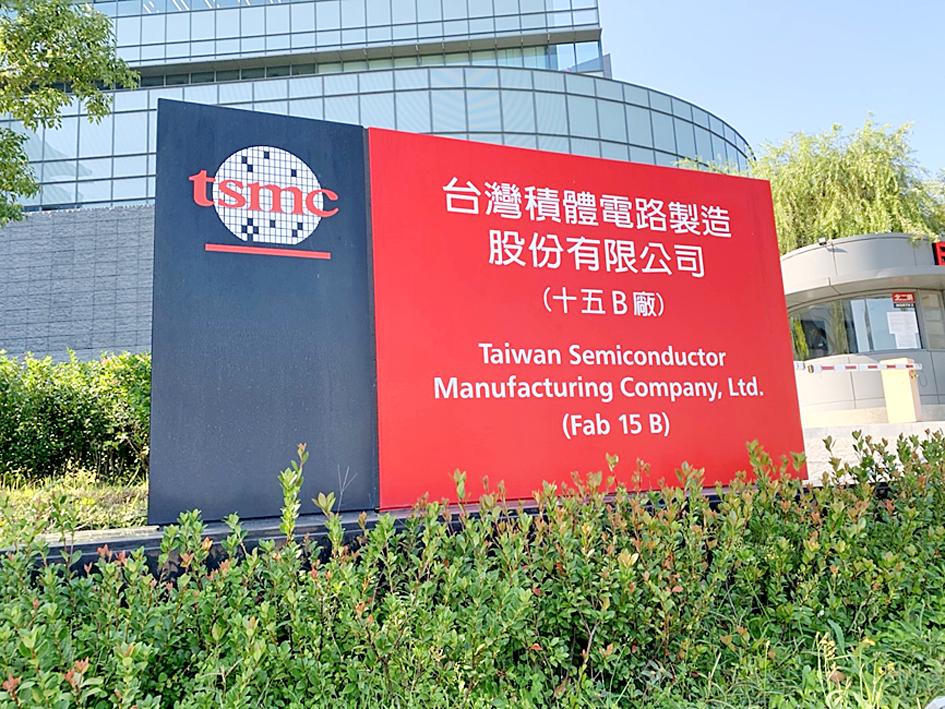The market capitalization of contract chipmaker Taiwan Semiconductor Manufacturing Co (TSMC, 台積電) surpassed NT$17 trillion (US$615 billion) yesterday after a US-based brokerage firm raised its target price for the stock, dealers said.
A robust showing by TSMC on the Taiwan Stock Exchange, where the stock rose 3.96 percent to close at the day’s high of NT$656, helped push TSMC’s market cap NT$648.2 billion higher than a session earlier to NT$17.01 trillion.
The stock got a boost overnight from a 7.06 percent surge in American depositary receipts (ADRs) for TSMC, and came after foreign institutional investors were net buyers of 32.54 million TSMC shares on Monday.

Photo: Hung Yu-fang, Taipei Times
Some of the momentum was driven by Sunday’s upbeat projection by the US-based brokerage, which raised its target price for the stock to NT$1,035 from NT$1,028 and left its “buy” recommendation unchanged.
The brokerage said that it expected TSMC’s consolidated sales this year to rise 26.1 percent from last year in US dollar terms, and its earnings per share to reach NT$29 to NT$30 per share.
Analysts said that another factor in the rally was the expectation among investors that TSMC would provide an optimistic outlook at its investors’ conference on Thursday next week, when it is to detail its results for the fourth quarter of last year and give guidance for this quarter.
On Monday next week, TSMC is scheduled to report its sales for last month, as well as its sales for the fourth quarter.
The chipmaker had forecast that its fourth-quarter consolidated sales would reach US$15.4 billion to US$15.7 billion, with the median estimate (US$15.55 billion) being 4.5 percent higher than the third quarter.
The brokerage firm forecast that TSMC would see a 3.7 percent sequential increase in consolidated sales in the first quarter, offsetting the effects of a traditionally slow season, as the company benefits from ongoing growth in emerging technologies.
To maintain its competitive advantage, the chipmaker has been gearing up to expand its manufacturing capacity by investing in Taiwan, the US, Japan and China, the brokerage firm said, adding that the company would also increase capital expenditures over the next three years by US$8 billion for a total of US$108 billion.

Merida Industry Co (美利達) has seen signs of recovery in the US and European markets this year, as customers are gradually depleting their inventories, the bicycle maker told shareholders yesterday. Given robust growth in new orders at its Taiwanese factory, coupled with its subsidiaries’ improving performance, Merida said it remains confident about the bicycle market’s prospects and expects steady growth in its core business this year. CAUTION ON CHINA However, the company must handle the Chinese market with great caution, as sales of road bikes there have declined significantly, affecting its revenue and profitability, Merida said in a statement, adding that it would

i Gasoline and diesel prices at fuel stations are this week to rise NT$0.1 per liter, as tensions in the Middle East pushed crude oil prices higher last week, CPC Corp, Taiwan (台灣中油) and Formosa Petrochemical Corp (台塑石化) said yesterday. International crude oil prices last week rose for the third consecutive week due to an escalating conflict between Israel and Iran, as the market is concerned that the situation in the Middle East might affect crude oil supply, CPC and Formosa said in separate statements. Front-month Brent crude oil futures — the international oil benchmark — rose 3.75 percent to settle at US$77.01

RISING: Strong exports, and life insurance companies’ efforts to manage currency risks indicates the NT dollar would eventually pass the 29 level, an expert said The New Taiwan dollar yesterday rallied to its strongest in three years amid inflows to the nation’s stock market and broad-based weakness in the US dollar. Exporter sales of the US currency and a repatriation of funds from local asset managers also played a role, said two traders, who asked not to be identified as they were not authorized to speak publicly. State-owned banks were seen buying the greenback yesterday, but only at a moderate scale, the traders said. The local currency gained 0.77 percent, outperforming almost all of its Asian peers, to close at NT$29.165 per US dollar in Taipei trading yesterday. The

RECORD LOW: Global firms’ increased inventories, tariff disputes not yet impacting Taiwan and new graduates not yet entering the market contributed to the decrease Taiwan’s unemployment rate last month dropped to 3.3 percent, the lowest for the month in 25 years, as strong exports and resilient domestic demand boosted hiring across various sectors, the Directorate-General of Budget, Accounting and Statistics (DGBAS) said yesterday. After seasonal adjustments, the jobless rate eased to 3.34 percent, the best performance in 24 years, suggesting a stable labor market, although a mild increase is expected with the graduation season from this month through August, the statistics agency said. “Potential shocks from tariff disputes between the US and China have yet to affect Taiwan’s job market,” Census Department Deputy Director Tan Wen-ling